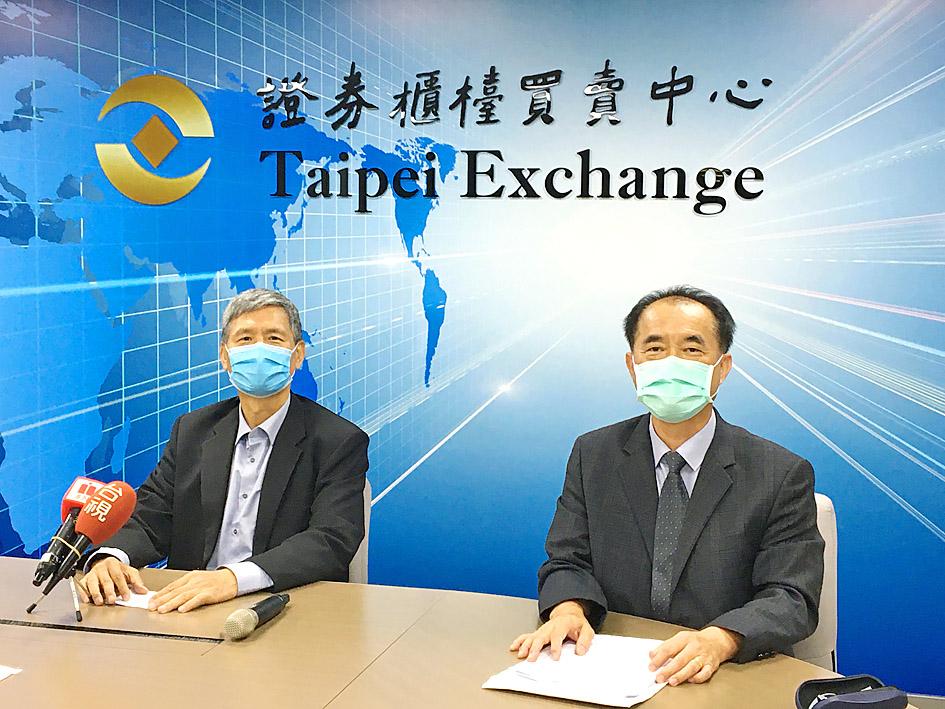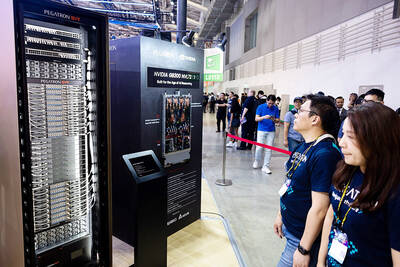Chipbond Technology Corp (頎邦) yesterday said it plans to acquire about a 31 percent stake in Orient Semiconductor Electronics Ltd (華泰電子) in a cash-and-share deal, aiming to make inroads into flash memory-chip packaging.
Chipbond said the strategic alliance would open the door for the company to enter the flash memorychip packaging and testing market, which is a new business for the Hsinchu-based company. Chipbond primarily provides testing and packaging services for driver integrated circuits that are used in flat panels.
BUSINESS OPPORTUNITY

Photo: CNA
“Except for flash memory chips, we also saw a lot of new businesses that require the technologies of Chipbond or Oriental Semiconductor,” Chipbond chairman Wu Fei-jain (吳非艱) told a media briefing at the Taiwan Stock Exchange yesterday.
Orient Semiconductor’s existing shareholders, including flash memory controller supplier Phison Electronics Corp (群聯電子) and memory module maker Kingston Solutions Inc (金士頓科技), are also potential clients for the new venture, Wu said.
The partnership between the two firms would create a win-win situation as Chipbond’s customers, products and client portfolios are complementary to those of Oriental Semiconductor, Wu said.
He expects the synergy to take place in the second half of next year.
BIG SPENDING
Chipbond plans to spend NT$820.4 million (US$28.31 million) on buying 12.71 percent of Orient Semiconductor shares from the manufacturer’s mayor shareholders.
Each share is priced at NT$11.59, representing a discount of 1.78 percent compared with Oriental Semiconductor’s closing price of NT$11.8 yesterday.
It also plans to subscribe to 300 million special shares to be issued by Oriental Semiconductor, Chipbond said.
Oriental Semiconductor provides manufacturing services and chip packaging services for flash memory chip makers and flash memory controller suppliers.
SMOOTH DEAL
Wu said that the talks went smoothly and were wrapped up within just two months.
Oriental Semiconductor said the deal would help significantly alleviate its financial burden.
The company lost NT$266 million in the first half of this year, or losses per share of NT$0.48.
Chipbond earned NT$1.63 billion, or NT$2.5 per share, in net profit during the first half of this year.

AI TALENT: No financial details were released about the deal, in which top Groq executives, including its CEO, would join Nvidia to help advance the technology Nvidia Corp has agreed to a licensing deal with artificial intelligence (AI) start-up Groq, furthering its investments in companies connected to the AI boom and gaining the right to add a new type of technology to its products. The world’s largest publicly traded company has paid for the right to use Groq’s technology and is to integrate its chip design into future products. Some of the start-up’s executives are leaving to join Nvidia to help with that effort, the companies said. Groq would continue as an independent company with a new chief executive, it said on Wednesday in a post on its Web

RESPONSE: The Japanese Ministry of Finance might have to intervene in the currency markets should the yen keep weakening toward the 160 level against the US dollar Japan’s chief currency official yesterday sent a warning on recent foreign exchange moves, after the yen weakened against the US dollar following Friday last week’s Bank of Japan (BOJ) decision. “We’re seeing one-directional, sudden moves especially after last week’s monetary policy meeting, so I’m deeply concerned,” Japanese Vice Finance Minister for International Affairs Atsushi Mimura told reporters. “We’d like to take appropriate responses against excessive moves.” The central bank on Friday raised its benchmark interest rate to the highest in 30 years, but Bank of Japan Governor Kazuo Ueda chose to keep his options open rather than bolster the yen,

Even as the US is embarked on a bitter rivalry with China over the deployment of artificial intelligence (AI), Chinese technology is quietly making inroads into the US market. Despite considerable geopolitical tensions, Chinese open-source AI models are winning over a growing number of programmers and companies in the US. These are different from the closed generative AI models that have become household names — ChatGPT-maker OpenAI or Google’s Gemini — whose inner workings are fiercely protected. In contrast, “open” models offered by many Chinese rivals, from Alibaba (阿里巴巴) to DeepSeek (深度求索), allow programmers to customize parts of the software to suit their

Global server shipments are expected to surge to 15 million units next year, from 4 million units this year, with artificial intelligence (AI) servers accounting for about 30 percent, driven by massive capital spending by major cloud service providers, the Market Intelligence and Consulting Institute (MIC) said on Thursday last week. Major cloud service providers — including Google’s parent company Alphabet Inc, Microsoft Corp, Amazon.com Inc and Meta Platforms Inc — are projected to budget US$450 million for capital expenditure next year, up from US$400 million this year, MIC ICT [information and communications technology] Industry Research Center director Edward Lin